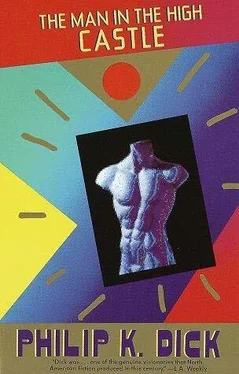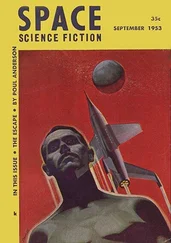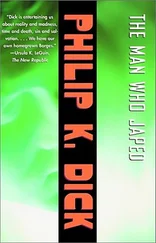On his arm, she saw a tattoo, a blue letter C.
“What”s that?” she asked. “Your wife? Connie? Corinne?”
Joe, washing his face, said, “Cairo.”
What an exotic name, she thought with envy. And then she felt herself flush. “I’m really stupid,” she said. An Italian, thirty-four years old, from the Nazi part of the world… he had been in the war, all right. But on the Axis side. And he had fought at Cairo; the tattoo was their bond, the German and Italian veterans of that campaign—the defeat of the British and Australian army under General Gott at the hands of Rommel and his Afrika Korps.
She left the bathroom, returned to the living room and began making the bed; her hands flew.
In a neat stack on the chair lay Joe’s possessions, clothes and small suitcase, personal articles. Among them she noticed a velvet-covered box, a little like a glasses’ case; picking it up, she opened it and peeked inside.
You certainly did fight at Cairo, she thought as she gazed down at the Iron Cross Second Class with the word and the date—June 10, 1945—engraved at its top. They didn’t all get this; only the valiant ones. I wonder what you did… you were only seventeen years old, then.
Joe appeared at the door of the bathroom just as she lifted the medal from its velvet box; she became aware of him and jumped guiltily. But he did not seem angry.
“I was just looking at it,” Juliana said. “I’ve never seen one before. Did Rommel pin it on you himself?”
“General Bayerlain gave them out. Rommel had already been transferred to England, to finish up there.” His voice was calm. But his hand once more had begun the monotonous pawing at his forehead, fingers digging into his scalp in that combing motion which seemed to be a chronic nervous tic.
“Would you tell me about it?” Juliana asked, as he returned to the bathroom and his shaving.
As he shaved and, after that, took a long hot shower, Joe Cinnadella told her a little; nothing like the sort of account she would have liked to hear. His two older brothers had served in the Ethiopian campaign, while he, at thirteen had been in a Fascist youth organization in Milan, his home town. Later, his brothers had joined a crack artillery battery, that of Major Ricardo Pardi, and when World War Two began, Joe had been able to join them. They had fought under Graziani. Their equipment, especially their tanks, had been dreadful. The British had shot them down, even senior officers, like rabbits. Doors of the tanks had to be held shut with sandbags during battle, to keep them from flying open. Major Pardi, however, had reclaimed discarded artillery shells, polished and greased them, and fired them; his battery had halted General Wavell’s great desperate tank advanced in ‘43.
“Are your brothers still alive?” Juliana asked.
His brothers had been killed in ‘44, strangled with wire by British commandos, the Long Range Desert Group which had operated behind Axis lines and which had become especially fanatic during the last phases of the war when it was clear that the Allies could not win.
“How do you feel about the British now?” she asked haltingly.
Joe said, “I’d like to see them do to England what they did in Africa.” His tone was flat.
“But it’s been—eighteen years,” Juliana said. “I know the British especially did terrible things. But—”
“They talk about the things the Nazis did to the Jews,” Joe said. “The British have done worse. In the Battle of London.” He became silent. “Those fire weapons, phosphorus and oil; I saw a few of the German troops, afterward. Boat after boat burned to a cinder. Those pipes under the water—turned the sea to fire. And on civilian populations, by those mass fire-bombing raids that Churchill thought were going to save the war at the last moment. Those terror attacks on Hamburg and Essen and—”
“Let’s not talk about it,” Juliana said. In the kitchen, she started cooking bacon; she turned on the small white plastic Emerson radio which Frank had given her on her birthday. “I’ll fix you something to eat.” She dialed, trying to find some light, pleasant music.
“Look at this,” Joe said. In the living room, he sat on the bed, his small suitcase beside him; he had opened it and brought out a ragged, bent book which showed signs of much handling. He grinned at Juliana. “Come here. You know what somebody says? This man—” He indicated the book. “This is very funny. Sit down.” He took hold of her arm, drew her down beside him. “I want to read to you. Suppose they had won. What would it be like? We don’t have to worry; this man has done all the thinking for us.” Opening the book, Joe began turning pages slowly. “The British Empire would control all Europe. All the Mediterranean. No Italy at all. No Germany, either. Bobbies and those funny little soldiers in tall fur hats, and the king as far as the Volga.”
In a low voice, Juliana said, “Would that be so bad?”
“You read the book?”
“No,” she admitted, peering to see the cover. She had heard about it, though; a lot of people were reading it. “But Frank and I—my former husband and I—often talked about how it would have been if the Allies had won the war.”
Joe did not seem to hear her; he was staring down at the copy of The Grasshopper Lies Heavy . “And in this,” he went on, “you know how it is that England wins? Beats the Axis?”
She shook her head, feeling the growing tension of the man beside her. His chin now had begun to quiver; he licked his lips again and again, dug at his scalp… when he spoke his voice was hoarse.
“He has Italy betray the Axis,” Joe said.
“Oh,” she said.
“Italy goes over to the Allies. Joins the Anglo-Saxons and opens up what he calls the “soft underbelly” of Europe. But that’s natural for him to think that. We all know the cowardly Italian Army that ran every time they saw the British. Drinking vino. Happy-go-lucky, not made for fighting. This fellow—” Joe closed the book, turned it around to study the back cover. “Abendsen. I don’t blame him. He writes this fantasy, imagines how the world would be if the Axis had lost. How else could they lose except by Italy being a traitor?” His voice grated. “The Duce—he was a clown; we all know that.”
“I have to turn the bacon.” She slid away from him and hurried back to the kitchen.
Following after her, still carrying the book, Joe went on, “And the U.S. comes in. After it licks the Japs. And after the war, the U.S. and Britain divide the world. Exactly like Germany and Japan did in reality.”
Juliana said, “Germany, Japan, and Italy.” He stared at her.
“You left out Italy.” She faced him calmly. Did you forget, too? she said to herself. Like everybody else? The little empire in the Middle East… the musical-comedy New Rome.
Presently she served him a platter of bacon and eggs, toast and marmalade, coffee. He ate readily.
“What did they serve you in North Africa?” she asked as she, too, seated herself.
Joe said, “Dead donkey.”
“That’s hideous.”
With a twisted grin, Joe said, “Asino Morte. The bully beef cans had the initials AM stamped on them. The Germans called it Alter Mann. Old Man.” He resumed his rapid eating.
I would like to read this, Juliana thought as she reached to take the book from under Joe’s arm. Will he be here that long? The book had grease on it; pages were torn. Finger marks all over it. Read by truck drivers on the long haul, she thought. In the one-arm beaneries late at night… I’ll bet you’re a slow reader, she thought. I’ll bet you’ve been poring over this book for weeks, if not months.
Opening the book at random, she read:
…now in his old age he viewed tranquillity, domain such as the ancients would have coveted but not comprehended, ships from the Crimea to Madrid, and all the Empire, all with the same coin, speech, flag. The great old Union Jack dipping from sunrise to sunset: it had been fulfilled at last, that about the sun and the flag.
Читать дальше










